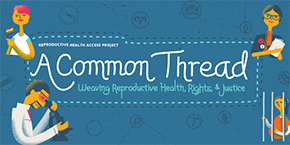Native American Heritage Month
 November was declared Native American Heritage Month in 1990. However, the fight for the celebration and national recognition of Native Americans’ and Alaskan Natives’ history, culture, and traditions began decades beforehand. Dr. Arthur C. Parker, historian and member of the Seneca Nation, was one of the early proponents of “American Indian Day.” During the early 1900s, he convinced the Boy Scouts of America to designate a day for the “First Americans.” For centuries, Native American and Alaskan Native activists have fought against colonial erasure and have mobilized to preserve their history, traditions, and autonomy. Central to this fight is defending the reproductive freedom of Native American and Alaskan Native Communities.
November was declared Native American Heritage Month in 1990. However, the fight for the celebration and national recognition of Native Americans’ and Alaskan Natives’ history, culture, and traditions began decades beforehand. Dr. Arthur C. Parker, historian and member of the Seneca Nation, was one of the early proponents of “American Indian Day.” During the early 1900s, he convinced the Boy Scouts of America to designate a day for the “First Americans.” For centuries, Native American and Alaskan Native activists have fought against colonial erasure and have mobilized to preserve their history, traditions, and autonomy. Central to this fight is defending the reproductive freedom of Native American and Alaskan Native Communities.
Systemic poverty and lack of access to quality health care disproportionally affect Alaska Natives and Native Americans. Per the CDC, “…nationwide, American Indian and Alaska Native infants are nearly twice as likely to die by their first birthday as non-Hispanic white infants.” [1] The rate of Sexually Transmitted Diseases amongst Alaska Native and Native American youth is one of the highest in the county.[2] Limited community-based research on the reproductive health needs of geographically and culturally diverse Alaska Native and Native American populations contributes to inadequate reproductive health services that do not meet the needs of indigenous communities.
This month, the Reproductive Health Access Project is proud to highlight indigenous activists combating reproductive oppression within the movement in our year-long reproductive justice campaign, “A Common Thread: Weaving Reproductive Health, Rights, and Justice.” You will get to read more about trailblazers like women’s health advocate and renowned coalition builder, Charon Asetoyer, who established the Native American Women’s Health Education Resource Center – a non-profit that focuses on several initiatives including cultural preservation, indigenous reproductive rights, and community-based research on Native American health needs. Additionally, you will learn more about activists like Madonna Thunder Hawk, co-founder of Women of All Red Nations, an organization that advocated for indigenous women forcibly sterilized, fought for indigenous land restoration, and highlighted the detrimental effects of environmental racism on Native Americans’ health.
